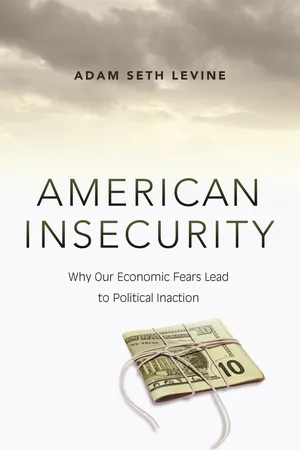
- 320 pages
- English
- ePUB (mobile friendly)
- Available on iOS & Android
About This Book
Why economic insecurity spurs so little collective political action Americans today face no shortage of threats to their financial well-being, such as job and retirement insecurity, health care costs, and spiraling college tuition. While one might expect that these concerns would motivate people to become more politically engaged on the issues, this often doesn't happen, and the resulting inaction carries consequences for political debates and public policy. Moving beyond previously studied barriers to political organization, American Insecurity sheds light on the public's inaction over economic insecurities by showing that the rhetoric surrounding these issues is actually self-undermining. By their nature, the very arguments intended to mobilize individuals—asking them to devote money or time to politics—remind citizens of their economic fears and personal constraints, leading to undermobilization and nonparticipation.Adam Seth Levine explains why the set of people who become politically active on financial insecurity issues is therefore quite narrow. When money is needed, only those who care about the issues but are not personally affected become involved. When time is needed, participation is limited to those not personally affected or those who are personally affected but outside of the labor force with time to spare. The latter explains why it is relatively easy to mobilize retirees on topics that reflect personal financial concerns, such as Social Security and Medicare. In general, however, when political representation requires a large group to make their case, economic insecurity threats are uniquely disadvantaged.Scrutinizing the foundations of political behavior, American Insecurity offers a new perspective on collective participation.
Frequently asked questions
Information
Table of contents
- Cover Page
- Title Page
- Copyright Page
- Contents
- Acknowledgments
- 1. Financial Threats and Self-Undermining Rhetoric
- 2. Do Americans View Financial Threats as Important Political Issues?
- 3. Who Mobilizes?
- 4. Why Rhetoric about Economic Insecurity Can Be Self-Undermining
- 5. How People Respond to Participation Requests
- 6. Political Voice across Issues
- 7. Self-Undermining Rhetoric in the Past and Present
- Appendix A: Multivariate Models from Chapter 2
- Appendix B: Analysis of the Washington D.C., Interest-Group Community
- Appendix C: Multivariate Models from Chapter 5
- Appendix D: Noncompliance in the ACSCAN Donation Experiment
- Appendix E: Materials for Experiments in Chapter 5
- Appendix F: Multivariate Models from Chapter 6
- Appendix G: Details on Variable Coding for Multivariate Models throughout the Book
- Notes
- Bibliography
- Index